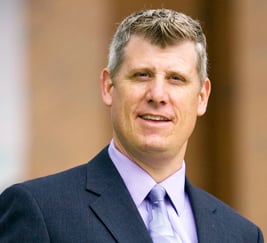“The future is something which everyone reaches at the rate of sixty minutes an hour, whatever he does, whoever he is.” - C. S. Lewis
Great and effective leaders know that time is the most precious commodity and resource they must manage and leverage. This is because unlike money, energy and talent, time is not a renewable commodity or resource. You only get to spend it once and how time is spent determines the bulk of life’s most significant outcomes. When leaders are good stewards of time, they are content with the present, benefit from their past and establish preferred futures.
While we all have life-spans that will ultimate vary, the time we have at our disposal each day is the same – 24 hours. In that sense, time presents an incredibly equal opportunity. However, our use of time is also what distinguishes us. Time is ultimately something that the most effective leaders are mindful of when it comes to simultaneously creating desirable legacies and futures within the same moment by moment progression .
In an article entitled The Surprising, Scientifically Proven Secret to Adding More Hours to the Day, Jessica Stillman relates, “Your clock may tell you that time passes at a constant speed, but both subjective reality and psychology prove that's nonsense.” There are times where life seems to go by faster than it does at other times. There are moments where our uses of time make us feel vital and there are times where life seems laborious, monotonous or even painful. There are also moments where time feels well utilized and moments where time feels wasted.
Great leaders are aware that their expenditures of time are more valuable than their expenditures of money or energy. They make use of time in ways that others don’t. In short, effective leaders make better use of time than ineffective leaders do. So just how do they do that?
1) Great Leaders Make Their Time Their Servant, Rather Than Their Master
The rapid evolution of technology allows us to do things faster than ever before. However, because it allows us to do things more efficiently, it also adds to the numbers of collective tasks and things we are undertaking in our jobs and lives overall. As a result, life seemingly gets increasingly hectic, interrupted, complicated and fast-paced. We are tempted to place what others tell us is urgent over what we know is important. Well-planned activities can often become usurped by hectic busyness. If you allow this, the urgent will bring tyranny to your life, trample your values and disrupt all peace. Times of quiet reflection bring clarity. Effective leaders realize that times of reflection are worth their weight in gold. If life were a snow globe, then times of reflection would be the things that allow all that shaken-up snow in our world to settle, so that we can ultimately see clearly through the sphere of activity that surrounds our lives.
We live among people who glorify busyness; many of us have allowed time to become a tyrant that controls our lives, rather than thinking of time as a servant under our control. Countless influences in the contemporary culture cause many to buy into the line of thinking that more is always better - more meetings, more measures, more programs, more people, more things, more activity...and it's ultimately just more to manage and more exhausting. However effective leaders look for ways to simplify and gain perspective. Historic leaders like Jesus of Nazareth regularly took time to get away to the “lonely places” where they could park the nonstop demands of the world, get perspective, get rest, get renewed and plug in to their mission. This practice helps leaders use time management in alignment with their values, rather than letting the dictates of time from others determine its haphazard-like utilization.
With the right perspective, time is a means to building a fulfilling legacy and vision simultaneously. With the wrong perspective, time is either a tyrant or it is a form of wasted wealth.
2) Great Leaders Make The Most of Their Time In Making Decisions
According to Steven B. Sample, whenever President Harry S. Truman was faced with a critical problem, issue or opportunity that required a presidential decision, he was famous for asking those presenting the concern, “How much time do I have?” in order to stay in front of the pressing issue. “Truman well understood that the timing of a decision could be as important as the decision itself. A long lead time opened the door for extensive consultation and discussion; a very short lead time meant the president could only look inside his own soul, and then only briefly, for an answer that might affect millions of people” (Sample, 2002, p. 80). Sample goes on to explain that “’Sometimes no decision by Tuesday is in fact a decision by default.’ In other words, if failing to make a decision by next Tuesday means that the decision will be effectively removed from the leader’s hands by external forces, or that his options will be significantly narrowed, he must have the courage to make a conscious decision by Tuesday and get on with it. For it is one thing for a leader to delegate a decision to a lieutenant, but an entirely different (and unacceptable) thing for him to surrender a decision to fate or to his adversaries” (Sample, 2002, p. 83). Effective leaders also understand that subordinates and peers often look for quick decisions from leaders because these types of decision time tables are most often favorable to the interests of those requiring them. Great leaders don’t let the lack of planning on the part of others create an emergency for everyone else. They also don't forfeit decisions.
Effective leaders make good use of time tables, morality, and subject matter experts when faced with important decisions. If they make errors in those decisions, they take personal responsibility for them because they realize that responsibility is the first step in learning from a mistake. They don’t spend time wallowing in self-pity or despair because they see those activities as a means of wasting time. Effective leaders realize that one of the most valuable uses of time comes when it is spent invested in learning, growth and betterment. Mistakes can be part of forward progression - providing they are accompanied by learning.
3) Great Leaders Manipulate the Progression of Time
Great leaders possess a significant power. They can actually slow down the expenditure of time and can even add time to their day. According to research done by Cassie Mogilner at the University of Pennsylvania’s Wharton School , “If you really want to get a sense of time expanding, the right course of action is to spend more of your limited downtime on others. "Mogilner and her colleagues asked some people to spend 10 or 30 minutes 'doing something for yourself that you weren't already planning to do today.' Others were assigned the task of spending 10 or 30 minutes on someone else, doing something that hadn't been planned," iDoneThis explains. How did the two groups compare? "Spending time on others expanded people's sense of the future" (Stillman, June 2014, para. 5). Effective leaders realize that this aspect of servant leadership – spending time on others – is not only a means to helping other grow, but it is also a means to expanding their own future (while slowing down their perceived sense of time).
New research from neuroscientist David Eagleman also reveals that time feels slower when you're learning and experiencing new things. It turns out that our sense of time isn’t even. “It’s dictated by how much information we need to process -- more information spells more time, which is why our younger years, when we’re processing lots and lots of new stuff, seem to pass so slowly” (Stillman, July 2013, para. 4). When we learn new things, visit new places, meet new people, and get spontaneous, life seems to slow down. However, when we get into routines and slip into familiar places, life seems to pass us by much faster. Eaglman relates, “The more familiar the world becomes, the less information your brain writes down, and the more quickly time seems to pass” (Stillman, July 2013, para. 5). Effective leaders take advantage of this. For instance, a leader may accelerate the time in their day by using routines in the morning, but might also slow down the momentum of time in the afternoon or evening with an opportunity to learn something new or to take in a new experience.
Lastly, effective leaders have the ability to slow down time by investing in some activities that are not goal oriented. Physicist Mikkel Anderson relates, “These are activities that are solely about being in the present” (Helmetag, 2014, para. 1). Spending time with pets and children can be a great way to establish a mindset that is not in the past or future. This is because this kind of company typically is consumed with play and spontaneity (activities geared to the present). Effective leaders invest a portion of their time in these activities.
Equipped with this understanding, effective leaders seemingly have the ability to manipulate their own sense of time, how it flows and may even influence that same sense of time utilization in others.
In summary, effective leaders make better use of time than less effective leaders do. This is not a haphazard occurrence, but rather, a deliberate one. Great leaders are time lords that dictate the effective use and flow of time, while less effective leaders may find themselves feeling more like time lackeys.
Additional Reading
- Avoiding Burnout: Renewal Requires More than Rest by Dr. Joel Hoomans
- Leading with your Head, Heart and Hands: 3 Observations from Women in Leadership by Donna McLaren
References
- Heimetag, K. (2014, October). How to slow down and enjoy life. http://www.realsimple.com/work-life/life-strategies/enjoy-life
- Sample, S. (2002). The contrarian’s guide to leadership. San Francisco: Jossey-Bass.
- Stillman, J. (2013, July). Time flies: here’s how to slow it down. Retrieved from http://www.realsimple.com/work-life/life-strategies/enjoy-life
- Stillman, J. (2014, June). The surprising, scientifically proven secret to adding more hours to the day. Retrieved from http://www.inc.com/jessica-stillman/the-surprising-scientifically-proven-secret-to-adding-more-hours-to-the-day.html?cid=sf01002












